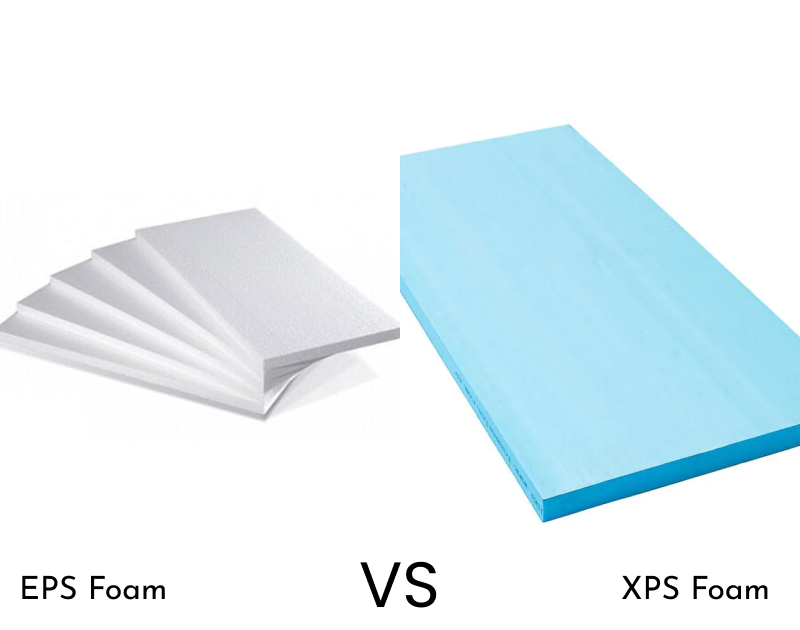
EPS vs XPS Insulation
Which is better, EPS or XPS Insulation?
EPS vs XPS insulation: Compare the insulating properties, moisture resistance, and suitability for various construction scenarios. XPS (Extruded Polystyrene) insulation excels in moisture resistance, compressive strength, and thermal performance. Its closed-cell structure makes it ideal for water-prone areas and load-bearing applications. EPS (Expanded Polystyrene) offers budget-friendliness and a smaller environmental impact. Choose XPS for high-demand scenarios, like flat roofing, or EPS for cost-effective solutions. Consider factors such as project needs, budget, and environmental concerns to make right choice between the two.
Comparison between EPS and XPS Insulation:
The choice between EPS Foam (Expanded Polystyrene) and XPS Foam (Extruded Polystyrene) depends on specific project requirements and priorities. Each type has its advantages and disadvantages. Here’s a comparison to help you make an informed decision:
1. Thermal Performance:
– XPS Board typically has a slightly higher R-value (a measure of thermal resistance) than EPS Board, which means it provides slightly better insulation per unit thickness.
2. Moisture Resistance:
– XPS Foam has a closed-cell structure, making it inherently more resistant to moisture absorption compared to the open-cell structure of EPS Foam . XPS Insulation is often preferred for applications where moisture resistance is critical, such as below-grade insulation or in areas prone to water exposure.
3. Compressive Strength:
– XPS Insulation generally has higher compressive strength compared to EPS Insulation. This makes XPS Board more suitable for applications where the insulation might experience heavy loads or pressure, such as under flooring or in flat roofing systems.
4. Cost:
– EPS Board is often less expensive than XPS Board, which can make it an attractive choice for projects with budget constraints.
5. Environmental Impact:
– EPS Insulation can be considered more environmentally friendly in terms of production, as the manufacturing process generates fewer greenhouse gas emissions compared to XPS Sheets production.
6. Installation:
– Both EPS Panels and XPS Foam Board Insulation are lightweight and relatively easy to handle and install. However, XPS Thermal Performance is often considered easier to cut and shape due to its dense, closed-cell structure.
7. Fire Performance:
– XPS Foam tends to have better fire resistance due to its more compact cellular structure. Flame-retardant XPS Thermal Performance options are also available.
8. Longevity:
– Both EPS Thermal Insulation and XPS Sheets are durable and can have long lifespans when properly installed and protected from UV radiation. XPS Durable Insulation might have a slight edge in terms of long-term moisture resistance.
In summary, after comparing EPS vs XPS, we came to this conclusion: XPS Durable insulation offers better moisture resistance, higher compressive strength, and slightly better thermal performance compared to EPS Lightweight Insulation. However, EPS Expanded Bead Foam is generally more budget-friendly and has a smaller environmental footprint. The choice between the two depends on factors such as the specific application, budget, project requirements, and environmental considerations. Consulting with a construction professional or an insulation specialist can help you determine the best option for your project.













Which type of insulation should I choose if I want to insulate my home on a tight budget
Hello Emily,
If you’re looking for a cost-effective insulation solution, Expanded Polystyrene (EPS) insulation is generally the more budget-friendly option compared to Extruded Polystyrene (XPS). EPS offers insulation at a lower cost, making it a suitable choice for homeowners with budget constraints.
I live in an area with high humidity and occasional flooding. Which insulation type is better for protecting my home from moisture damage?
Hello Ella,
In areas prone to moisture and water exposure, such as high humidity or flooding, it’s advisable to choose Extruded Polystyrene (XPS) insulation. XPS has a closed-cell structure that provides better resistance to moisture absorption compared to the open-cell structure of EPS. XPS is an excellent choice to help protect your home from moisture-related issues in such environments.